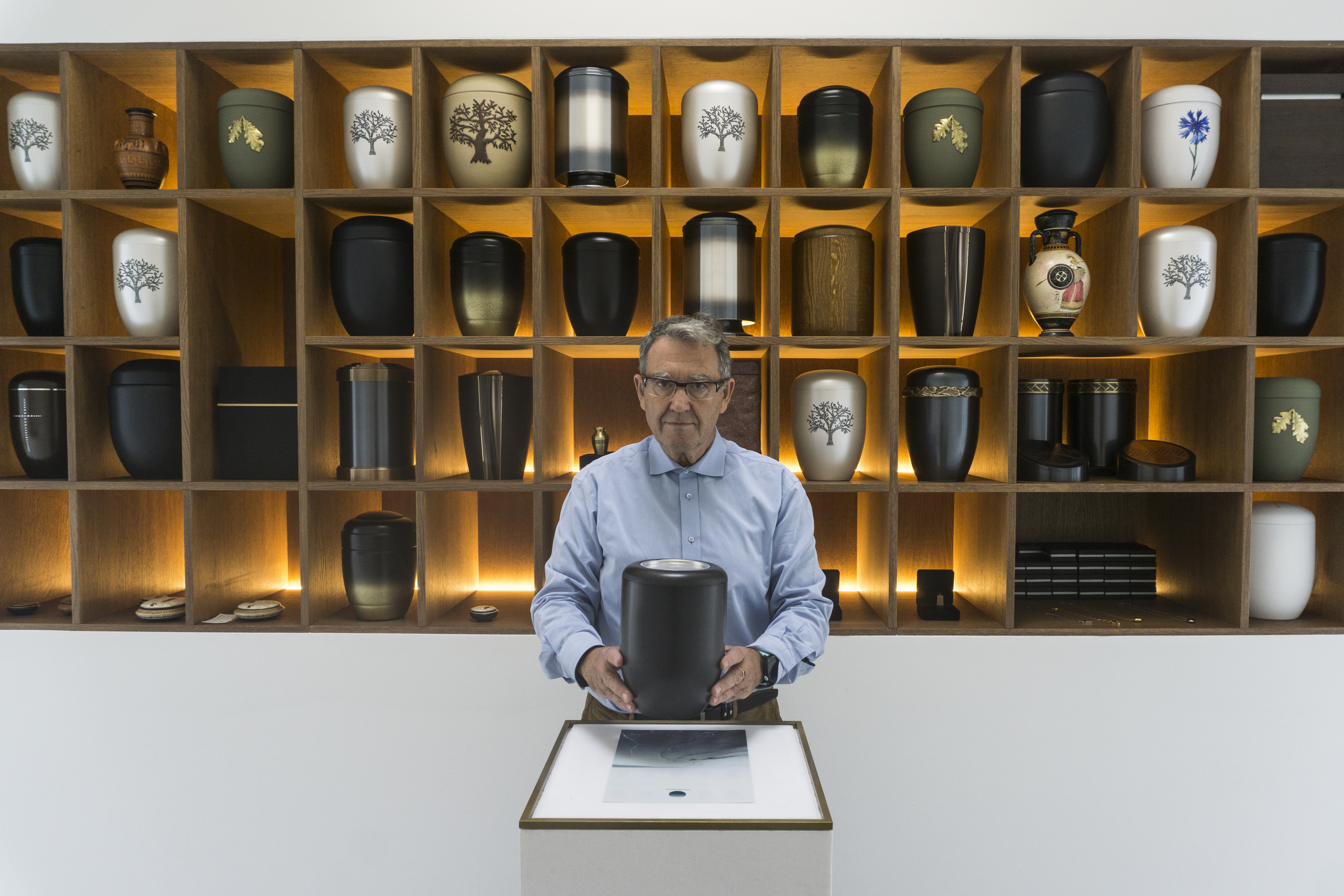Antonis Alakiotis stands in front of a collection of urns inside the crematorium in Ritsona, Greece. He opened the private crematorium in 2018 after a 20-year battle.
Avrilia Kosmaidou browsed through a leaflet with urns for sale. She wore a long, black, heavy coat with a pearl necklace and glasses. Featured urns come in various designs that sell for up to $443.
As a former worker in the funeral business, Kosmaidou is familiar with death. But the reason for her visit to Greece’s only crematorium — which opened in September 2019 — is personal: She is planning to cremate her best friend of over 40 years.
Related: Going green — after death
“Theodora was my sister; I can’t call her just friend,” Kosmaidou told The World. “She was suffering [from] lung cancer but she died because of an infection of the respiratory system.”
Greece’s first and only crematorium is privately owned. That’s because even though public crematoriums have been legal since 2006, no municipality has opened one due to a lack of space and pressure from the Greek Orthodox Church, which forbids cremation. (The vast majority of Greek citizens identify as Greek Orthodox, and the church holds considerable political sway.) Lack of space due to poor urban planning is another reason public cremation facilities are not being built. But with cemeteries filling up and the cost of traditional burials on the rise, cremation is the preferred option for a growing number of Greek citizens.
Greece’s first-ever crematorium is owned by Antonis Alakiotis, who provides the cremation services in Ritsona, a town outside of Athens, the capital.
Related: Syrian refugees in Lebanon are running out of space to bury their dead
For most people in Greece who want to cremate their loved ones, their only option has been to travel to Sofia, the Bulgarian capital, where the nearest public crematorium operates.
“She was thinking of cremation since she got worse with her health, but she was worried because it is very expensive to go to Bulgaria to be cremated,” Kosmaidou said. Kosmaidou also believed cremation services in Bulgaria were subpar.
“The crematorium [in] Bulgaria is very old and the smoke that comes out is very heavy, even though they have renovated it. … They burn [the dead] with flowers, varnished coffins [or] without coffins — they are completely disorganized. It’s a mess.”
“The crematorium [in] Bulgaria is very old, and the smoke that comes out is very heavy, even though they have renovated it,” she said. “They burn [the dead] with flowers, varnished coffins [or] without coffins — they are completely disorganized. It’s a mess.”
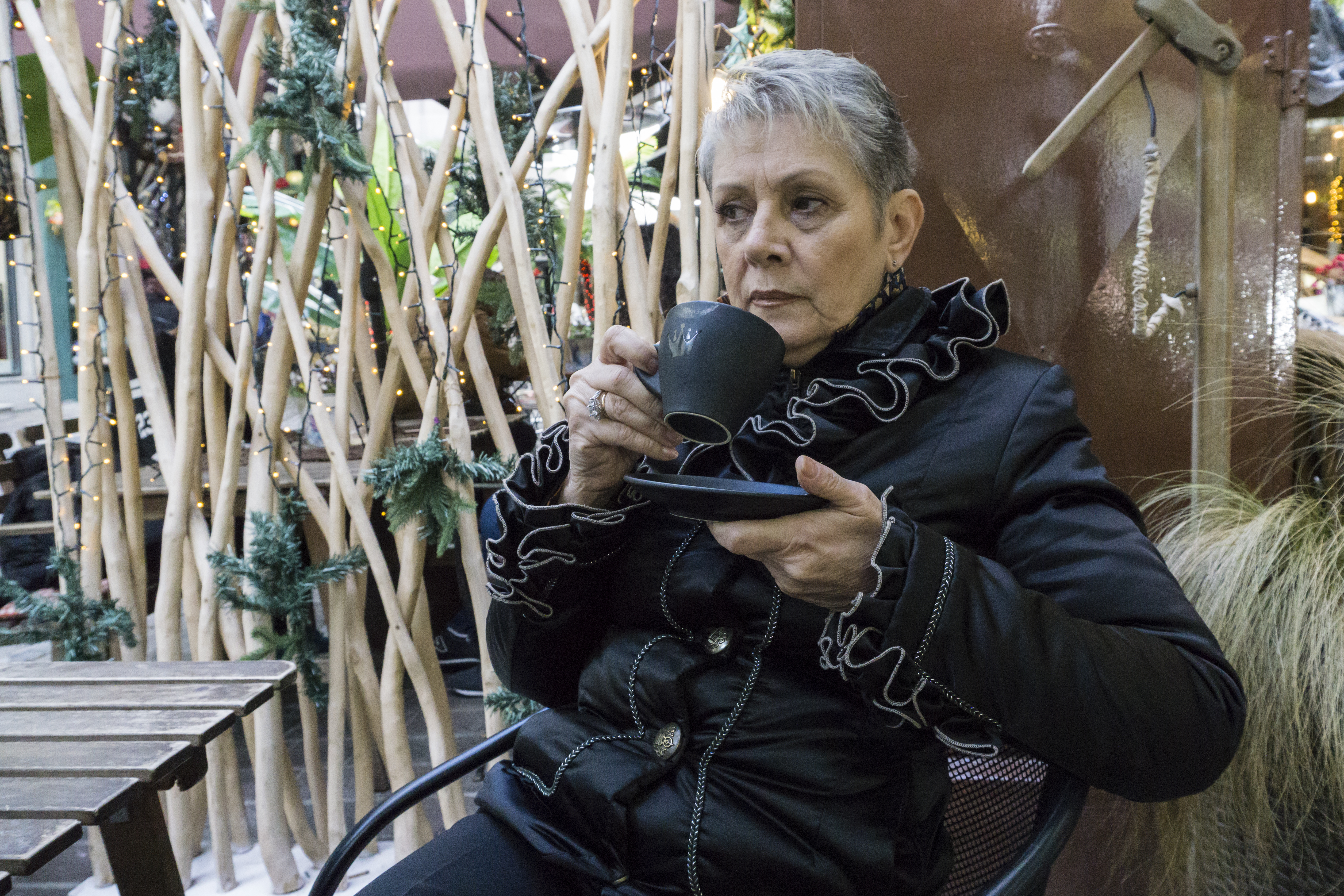
Alakiotis, the co-founder of the Greek Cremation Society and president of Crem Services, a private cremation facility and ash scattering service, has been personally fighting for a crematorium in Greece for more than 20 years.
“When, in 1996, I personally had to fulfill the last wish of a friend to be cremated, I was surprised to learn that Greece, a European country, member of the EU, hadn’t arranged yet a human right like this.”
“At the beginning, there was no law allowing for crematoriums to be built in Greece. It has been discussed many times in the past, also with the death of [singer] Maria Callas, but the Greek Orthodox Church was against it,” Alakiotis said. “When, in 1996, I personally had to fulfill the last wish of a friend to be cremated, I was surprised to learn that Greece, a European country, member of the EU, hadn’t arranged yet a human right like this.”
With the help of the then-mayor of Athens, Dora Bakoyianni, the Greek Parliament voted in 2006 for the first law allowing for public crematoriums to exist in Greece. In 2010, a second law clarified the details regarding technical procedures.
But it was only in 2017 that Greek law actually allowed individuals to build private crematoriums in Greece, as long as they are located in non-urban spaces.
It’s difficult to die in Greece
Greece’s first crematorium was established thanks to the insistence of Greek actress and member of parliament Anna Vagena. When her husband, the Greek singer Loukianos Kilaidonis, died at 74 from heart failure, Vagena hoped that his dying wish would be the beginning of a change in Greece.
Ultimately, the family traveled to Bulgaria to cremate the beloved singer. But the experience was so challenging that she returned to Greece determined to ensure that no one else had to experience it.
“Nobody was speaking English there, and we couldn’t communicate. It was surreal,” she said.
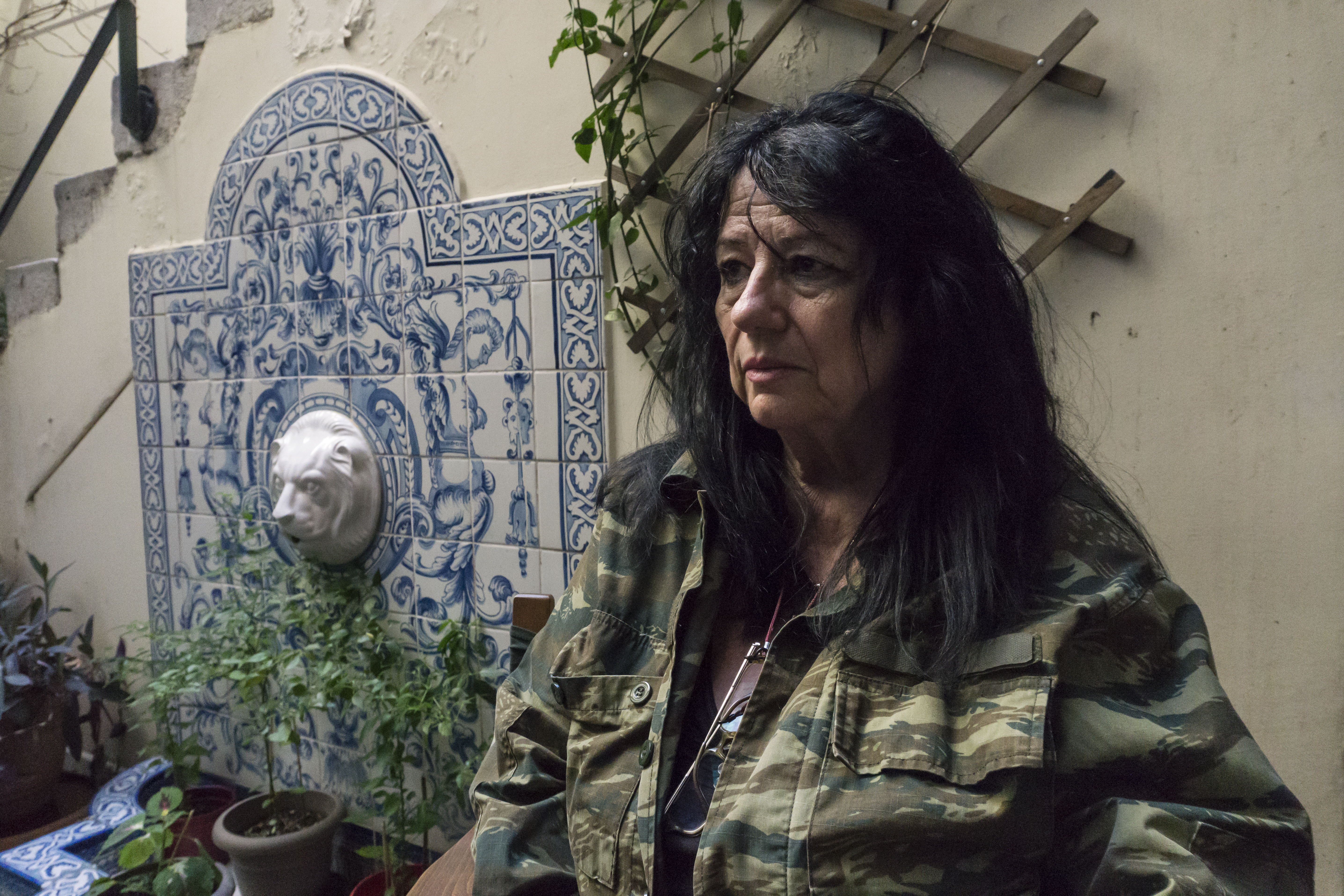
According to Alakiotis, Bulgarian officials do not keep good cremation records, and most records are sent back in Bulgarian, a language very few Greeks understand.
“We think that about 600 to 700 families go each year to Sofia. … Here, since Sept. 30, when we opened, we’ve done around 80 cremations per month. We believe we will reach the 1,000 cremations the first year, which is 30% up from Bulgaria.”
“We think that about 600 to 700 families go each year to Sofia,” Alakiotis said. “Here, since Sept. 30, when we opened, we’ve done around 80 cremations per month. We believe we will reach 1,000 cremations the first year, which is 30% up from [the number performed in] Bulgaria.”
When Vagena returned from Sofia, she received many messages and phone calls from people who asked her to “do something because we don’t want and can’t afford to go abroad,” she said.
A member of the leftist SYRIZA party, she took the messages to the Parliament and managed to update the law to allow citizens to build private crematoriums like the one in Ritsona.
About two hours away from central Athens, near a secluded forest, construction of the first crematorium in Greece started in 2018.
It extends to 11 acres of land, with the main building and a rose garden in the back where people can bury the ashes of their loved ones. It cost more than $4,433,800 to build.
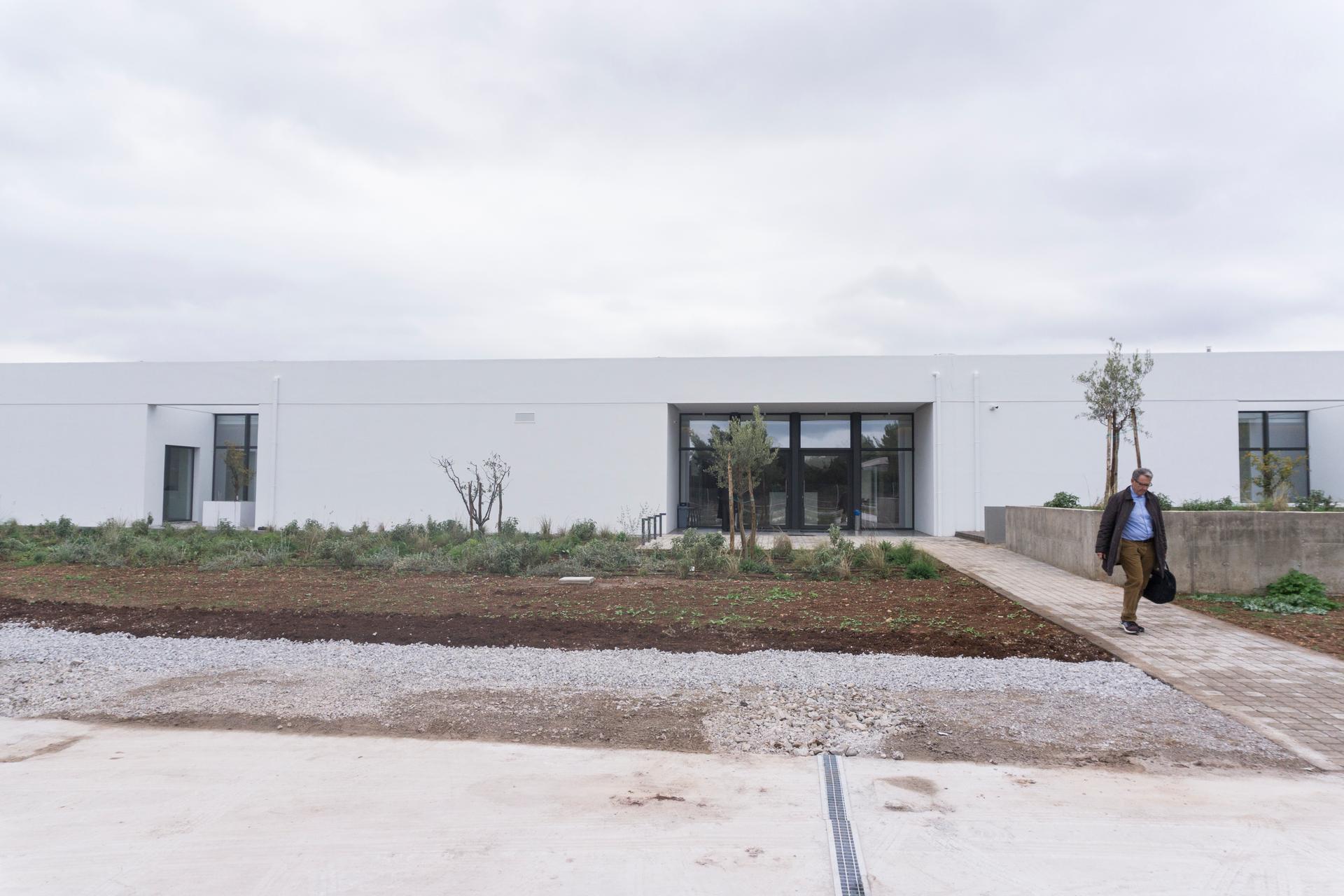
Apostolos Douptsos, a funeral home owner, has seen a rise in client requests for cremation in the last two months since the crematorium at Ritsona opened. Now, people have a choice whether to bury or cremate their loved ones.
“We’ve been there eight times in the past two months,” he said. “Many people ask us about cremation for themselves, because they want to leave some money to their families for their funeral.”
Cremation in Greece costs about $1,662 ($665 goes to the crematorium, while the rest goes to the funeral home that arranges it). In Bulgaria, cremation services can cost up to $2,217 — not including travel expenses for mourners or the cost of transporting the deceased.
The cost of a traditional burial depends on the cemetery, Douptsos said. “The cheapest one can start at 1,200 euro [$1,330] but if you count the marble grave, the exhumation after the three years, and other services provided, it can go over 2,000 euro [$2,216],” he said. The costs can be a major burden on people living in a country that ranks among the EU’s poorest.
A traditional burial costs about $558 more than cremation, all costs included. That money can go a long way in Greece, a country that recently exited the third and final international bailout program in August 2018, but still needs time to recover economically.
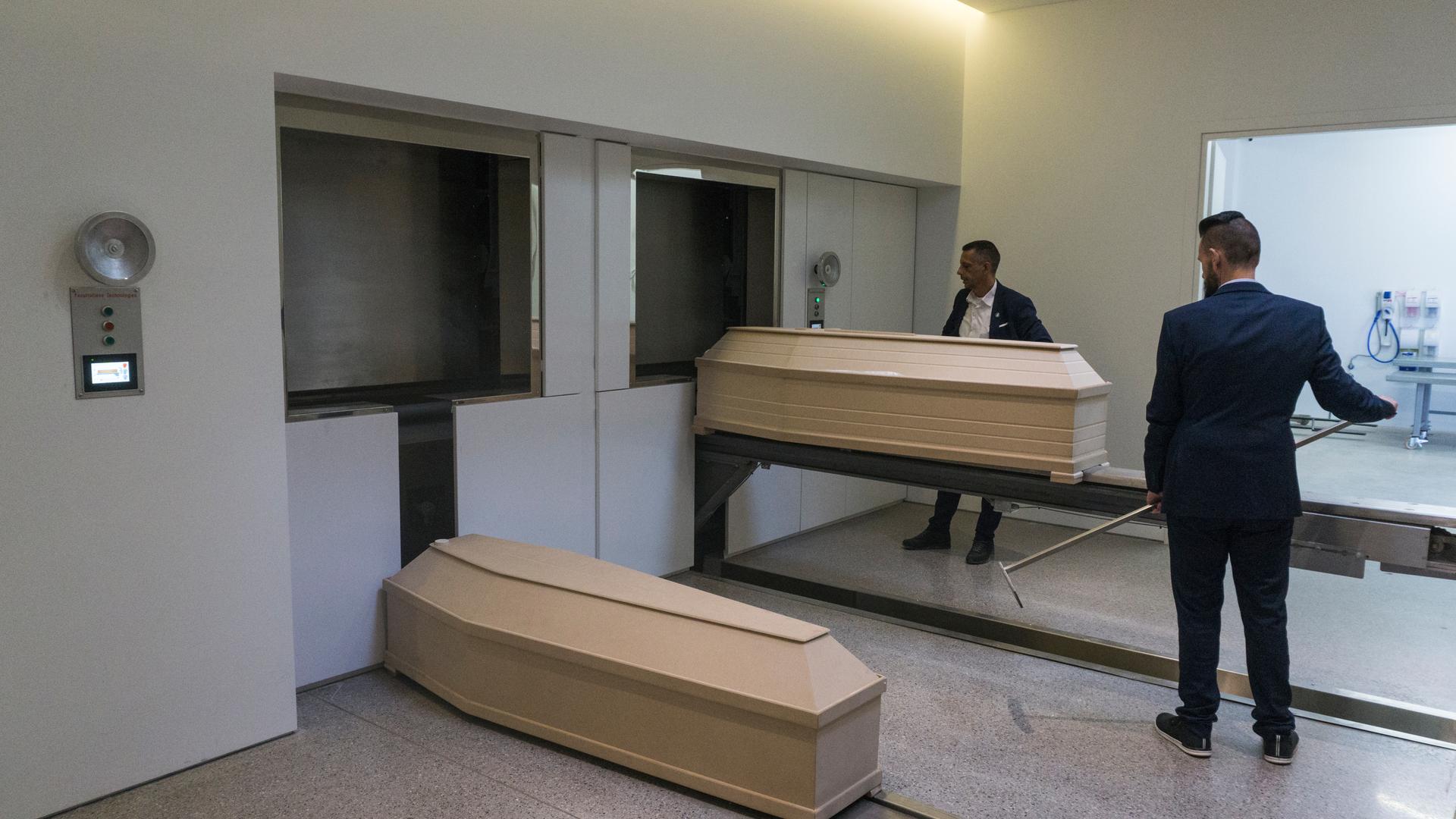
Fighting with religion
In recent years, Greek cemeteries have filled, forcing families to exhume the bodies of loved ones after three years and shift their bones to ossuaries — and once again go through a cycle of grief. This has led many families to prefer cremation over burial.
“With cremation, you get a more decent death, because it’s inhumane to put your loved one inside the mud and the leftovers of the previous diseased person; and then they make you take them [out] again after three years. A thousand times, [I prefer] cremation than [to] go through this stressful situation.”
“With cremation, you get a more decent death, because it’s inhumane to put your loved one inside the mud and the leftovers of the previous diseased person; and then they make you take them [out] again after three years. A thousand times, [I prefer] cremation than [to] go through this stressful situation,” Kosmaidou said.
The current percentage of Greek people who choose cremation over a burial is only 1-1.5%, but with the new crematorium, this number is expected to reach at least 5% in the first five years, Alakiotis said, according to the International Cremation Society.
This number is large, considering the predominance of Orthodox Christianity in Greece.
Recently, Greek clergy announced they will fight back against the rise of cremation in Greece. In a letter to parishioners distributed in every church last month, the Greek Orthodox Church explained why cremation is a sin: “Church can’t force anyone to abide by its traditions, but She has the right to regard burning as a violation of Her principles, traditions, and customs, and to hold that anyone who chooses to cremate is autonomous […] Those who do not want to follow the tradition of the Church have the right to opt for incineration, so they will not receive any funeral services from the Church.”
“If somebody wants to pray for their loved one, say goodbye inside a church and then instead of putting them under the ground, choose to cremate the body. I can’t understand why this is a problem.”
Vagena balks at the church’s position. “If somebody wants to pray for their loved one, say goodbye inside a church and then instead of putting them under the ground, choose to cremate the body. I can’t understand why this is a problem,” Vagena said.
Vagena said she was able to find a priest to say a prayer over her husband’s body before taking him to Bulgaria. “We gathered some close friends and family and with a priest, we prayed. We did it as if it was illegal, and that’s insane.”
“The choice of cremation is a sin and shows our wrong relationship with the church.”
The Metropolitan of Piraeus Seraphim, a prominent church leader in Greece, also sent out a newsletter to all the churches in his parish in late October, describing cremation as an insult to religion. “The choice of cremation is a sin and shows our wrong relationship with the church,” he wrote.
Alakiotis believes that the church will soon change its mind. “Despite the bold and aggressive nature of the church’s statements, there is moderation and a sense of reason. The church is flexible and has great adaptability. That’s why they survived for 2,000 years,” he said.
At the moment, Ritsona crematorium is the only one, although talks have started to open a public crematorium in Patra, Greece’s third-largest city. “Most of the mayors are afraid of the reactions of the church and the parishioners, and how that might cost them politically,” Vagena said.
This explains why no municipality had built one, she said, although, with the latest changes in the law, and with solutions to urban planning problems, the church alone is what holds them back.
“The fact that I am in favor of cremation has nothing to do with my faith. … I am a deeply religious person, but no priest can tell me what I will do with my body.”
“The fact that I am in favor of cremation has nothing to do with my faith,” Kosmaidou said. “I am a deeply religious person, but no priest can tell me what I will do with my body.”
